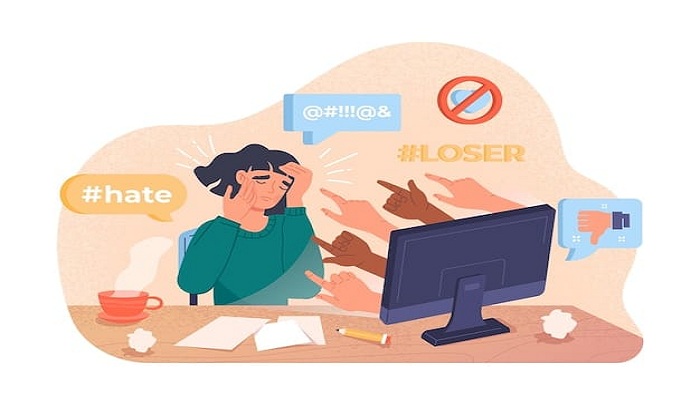Effects of cyberbulling on mental health

Effects of cyberbulling on mental health
Published On: 25-11-2024 | 2 min Read
Cyberbullying is bullying that takes place over digital devices like cell phones, computers, and tablets. Cyberbullying can occur through SMS, Text, and apps, or online in social media, forums, or gaming where people can view, participate in, or share content. Cyberbullying includes sending, posting, or sharing negative, harmful, false, or mean content about someone else. It can include sharing personal or private information about someone else causing embarrassment or humiliation. Some cyberbullying crosses the line into unlawful or criminal behavior.
Cyberbullying is bullying that takes place over digital devices like cell phones, computers, and tablets. Cyberbullying can occur through SMS, Text, and apps, or online in social media, forums, or gaming where people can view, participate in, or share content. Cyberbullying includes sending, posting, or sharing negative, harmful, false, or mean content about someone else. It can include sharing personal or private information about someone else causing embarrassment or humiliation. Some cyberbullying crosses the line into unlawful or criminal behavior.
Cyberbullying can take many forms. You are being cyberbullied if:
- you receive mean, threatening or abusive texts, tweets, emails or Facebook posts (either from someone you know, or a stranger)
- someone keeps sending you harassing messages
- photos or videos of you are shared to try and embarrass or hurt you
- people are trying to stop you communicating with others
- you are being left out of online games or social forums
- you are being trolled or stalked online
- someone hacks into your email, Facebook, Instagram or other social media account and changes your information
- someone sets up and uses fake profiles pretending to be you.
Top 5 Social Media Sites for Cyberbullying
- Facebook (75%)
- Instagram (24%)
- Twitter (24%)
- Snapchat (15%)
- TikTok (9%)
- Online gamming platforms.
Cyberbullying can have a significant negative impact on mental health, leading to feelings of anxiety, depression, low self-esteem, social isolation, suicidal thoughts, and even physical symptoms like headaches and stomach aches, as victims often feel overwhelmed, ashamed, and unsafe due to the persistent and public nature of online harassment; it can also disrupt academic performance and social relationships.
Depression:
Feeling down, hopeless, and losing interest in activities due to the constant negativity and humiliation experienced online.
Anxiety:
Excessive worry, nervousness, and fear related to going online or interacting with others due to the potential for further cyberbullying.
Low self-esteem:
Feeling worthless, inadequate, and having a negative self-image as a result of the hurtful comments and online attacks.
Social isolation:
Withdrawing from friends and family, avoiding social situations due to fear of further cyberbullying exposure.
Suicidal ideation:
In severe cases, cyberbullying can contribute to thoughts of suicide or self-harm, especially when combined with other mental health struggles.
Stress and sleep disturbances:
Difficulty sleeping due to constant worry and rumination about cyberbullying experiences.
Eating disorders:
In some cases, cyberbullying can trigger unhealthy eating patterns or behaviors.
Academic decline:
Difficulty concentrating on schoolwork due to the emotional distress caused by cyberbullying.
